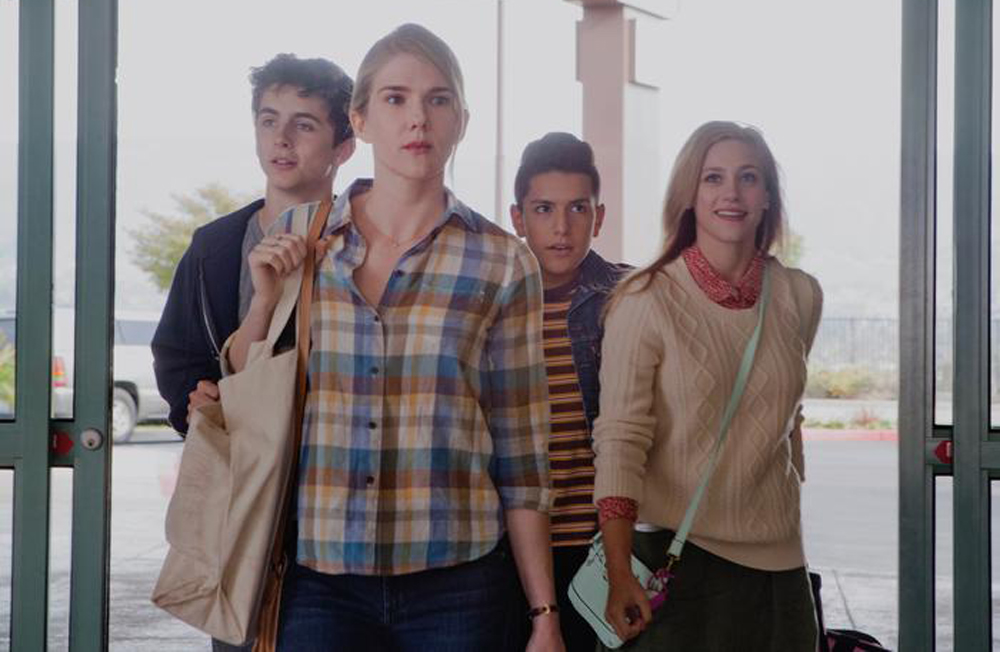It’s a moment that so few realize is actually happening until well after it does that one might feel compelled to thank Julia Hart for capturing it so precisely and eloquently in her directorial debut “Miss Stevens,” that instance when you discover growing up that the adults in your life are fumbling through life just as you are, perhaps just at a different speed, improvising as they go. Hart finds the ideal scenario for such an epiphany, the film’s title referring to the young teacher (Lily Rabe) who gets chaperone duty for a trio of high school drama club kids who need to go out of town for the weekend for a competition and finds the road a little rougher than expected as all are working though a bit of an identity crisis. Carrying in her blue Volvo station wagon a type-A college resume builder (Lili Reinhart), a kid with a real talent for acting likely because of some real personal pain to draw on (Timothee Chalamet), and another (Anthony Quintal) who is extremely comfortable in his own skin but starts to find others might not be around him, Miss Stevens may have more anxiety than all of them combined, seemingly at a loss for what comes next when she’s the one in charge.
While Hart slowly reveals the reasons behind Miss Stevens’ dismay, the film has a winning spirit about it, with the characters all showing glimpses of who they could become if they only they could find peace with what’s holding them back. Hart, on the other hand, doesn’t appear to have such limitations, displaying a quiet confidence in “Miss Stevens” melancholic tone and giving each member of her formidable cast the space to inhabit their characters fully, their transformation told in small gestures and actions that feel monumental by the end. As the film premiered this week at SXSW, Hart was joined by two of the film’s actors, “American Horror Story” star Rabe and YouTube sensation Quintal, to talk about the collaboration after casting to breathe life into the characters, enduring the heat of shooting inside a car, and living inside the hotel they shot in.
How did this come about?
Julia Hart: I was actually a teacher for eight years and taught high school for five. It’s so funny how we all think we have a sense of what it means to be a teacher because there are so many portrayed in film and television, but when I was actually in there, it’s the classic realization, “Oh, you don’t know until you’re doing it.” It was really important to me to portray what that relationship is actually like because I felt like I hadn’t seen it done authentically before. It is very different when you’re outside of the classroom, and [you’re a teacher and you] realize that [the students] are all just human beings, and [the students realize] your teacher is a human being.
Since you’ve written a number of different projects, why was this the one you wanted to direct?
Julia Hart: I watched another director direct my last script, “The Keeping Room” and I was like, “Oh, I need to do this.” I want to be telling my own story. This script is so close to my heart and so personal to me. My husband and I wrote it together. It felt like the right first story to tell since it was a world that was already so familiar to me.
Anthony, how did you guys get involved in this?
Anthony Quintal: I was reached out to by Julia, which I’m so thankful for, and got introduced to the character, Sam, who is pretty much like me, so being him was not hard at all. He’s so open and he adds a little bit of spark to the group that I think is definitely needed.
Was it different doing a film as opposed to YouTube shorts?
Anthony Quintal: Of course, yeah. When I do my YouTube, I just turn on the camera and see what happens. With a movie like this, everything’s so thought out and so plotted and everything has to be right. It was definitely refreshing doing that. It was so fun. I would do it again in a heartbeat.
Julia Hart: I was so proud of him, too. Never having acted before, his performance was so beautiful and funny and charming. The audience falls in love with him because he’s so natural and he was so comfortable and ready and he knew his lines. You just create these characters in the ether, then suddenly you meet someone and you’re like, “Oh, hey. There you are,” and I rewrote a lot of the part once I actually started to get to know Anthony to be even more who he is.
Was that true of most of the actors?
Julia Hart: Whether directing the movie or not, I think it’s a good idea for any writer – once an actual human is cast that’s no longer this two-dimensional person on paper – to be writing with that person in mind because it just allows the character to come to life. Obviously, good actors can do anything, but it doesn’t hurt to bring them some of them in, let your mind wander and be inspired by who they are as an actor, and as a person.
Lily Rabe: There was something too in the earlier drafts of “Miss Stevens,” where obviously Julia had a deep, nuanced understanding of who Miss Stevens is and why she does the things she does or doesn’t and when I read the script, I instantly felt the same way. She’s very different than I am in my own life, but I just felt that I knew who she was and why. In earlier drafts, people would say, “…but why does she do this, or why that?” And we were scratching our heads like, “isn’t it obvious? It’s because she’s who she is.” So I think there was something about [the characters that was] already there but…
Julia Hart: It needed to be brought to the surface.
Lily Rabe: We both had an understanding of who she was that matched up artistically, so it was like taking that to the next level together, although really it’s all credit to the person Julia created from the get go.
For Lily, was it simply that strong connection of the material that got you interested or something about this character?
Lily Rabe: Both. I loved the story, but I also love Julia’s writing – I don’t think there’s a better writer writing films out there. I read a lot of scripts and when I read a script, it’s not just about “Do I like this character?” It’s “Do I feel like I can tell this person’s story, but also do I want these words in my mouth?” And [in this case] I did. [laughs] And I feel that way about Julia’s writing in a very strong and unique way.
One of the things I really liked in the film is how it’ll pause to watch the characters think, which is often as intriguing as anything else. Was that something that’s embedded in the screenplay from the start or whether you find those things as you’re watching what’s going on set?
Julia Hart: No, those were moments that were very much written into the script. That’s one of the privileges of directing your own script is that you can just shoot your script if you want to. I love stillness on film, but I love running dialogue, so I have to be careful to pull back sometimes and make sure I allow the film to have those still, quiet moments. I also think, in this movie in particular, because its so much about performance and observation that it was really important to not just show people watching a performance literally, but also the ways in which life itself is a performance. We’re always watching somebody and somebody is often watching us.
Did life imitate art in the fact that perhaps you might’ve stayed at the hotel you shot in?
Anthony Quintal: Yeah, I stayed at the hotel for a good amount of time, like my entire filming process.
Julia Hart: Timothee [Chalamet] did too, right?
Anthony Quintal: Yes! Timothee and I were roommates. We stayed on the same floor, and it was a pretty fun time actually living in the hotel that you were fake living at.
Julia Hart: The hotel was very much, even at the script level, always meant to be a character in the film. When we were location scouting, when we got there we were just like, “This is it, this is our home, this feels like the place” and I just feel great the kids were actually staying there. We all definitely flopped down on the bed once in a while and it was really fun having that be such a part of the experience.
The other two teens got to perform monologues from famous plays that spoke to who their characters were – did Anthony get one?
Anthony Quintal: I did have a monologue, but you don’t see me perform it actually onstage, but I’m reciting it in the car [on the way there].
Julia Hart: I liked the idea of not having a film audience sit through all three of the monologues in the final competition, but to show that you see a final performance of a thing as a consumer that there are so many steps and layers to getting to that place, so I wanted to show rehearsal practice and final performance.
Was there a particular crazy day of shooting?
Julia Hart: The car was really hot.
Lily Rabe: There was no air conditioning in the car.
Julia Hart: …Because for sound, you have to have the windows up and you cannot have air conditioning on. And there was no air conditioning [in the car] anyway.
Anthony Quintal: The car was packed with mini, portable fans.
Lily Rabe: Really what we needed were towels. It was way beyond hot.
Julia Hart: Car work is hard and laborious on any movie no matter what your budget, and even more so on a small budget film, so they were in this hot box for a day-and-a-half.
Lily Rabe: That being said, I love that car. I did not want to say good bye to that car. Every time I had to touch something new in the car, like a piece of it would come off in my hand. I loved that car.
Julia Hart: It was written into the script that it was an old beat-up car…
Lily Rabe: And a Volvo specifically, which is just happens to be…and this is not saying that Julia knew this about me-
Julia Hart: No, I didn’t know this-
Lily Rabe: It was basically the car that I learned to drive in. It was almost the exact same one. I found this old childhood picture with it in the background that then became my car.
For Julia, was directing what you thought it would be?
Julia Hart: It was a lot easier that I thought it would be. I was so stunned by the ease of the process. I have a son, so I know what giving birth is like and writing feels like that. It’s an incredible experience but it’s also really hard. It’s very lonely. The set is so fun and vibrant, and alive and collaborative. If you’re a good director and you’ve hired amazing actors and crew, you just get to sit back, relax and enjoy the show. I loved it. I hope I get to do it again very soon.
“Miss Stevens” will open on September 16th in New York at the Cinema Village and in Los Angeles at the Sundance Sunset Cinemas.





Comments 1